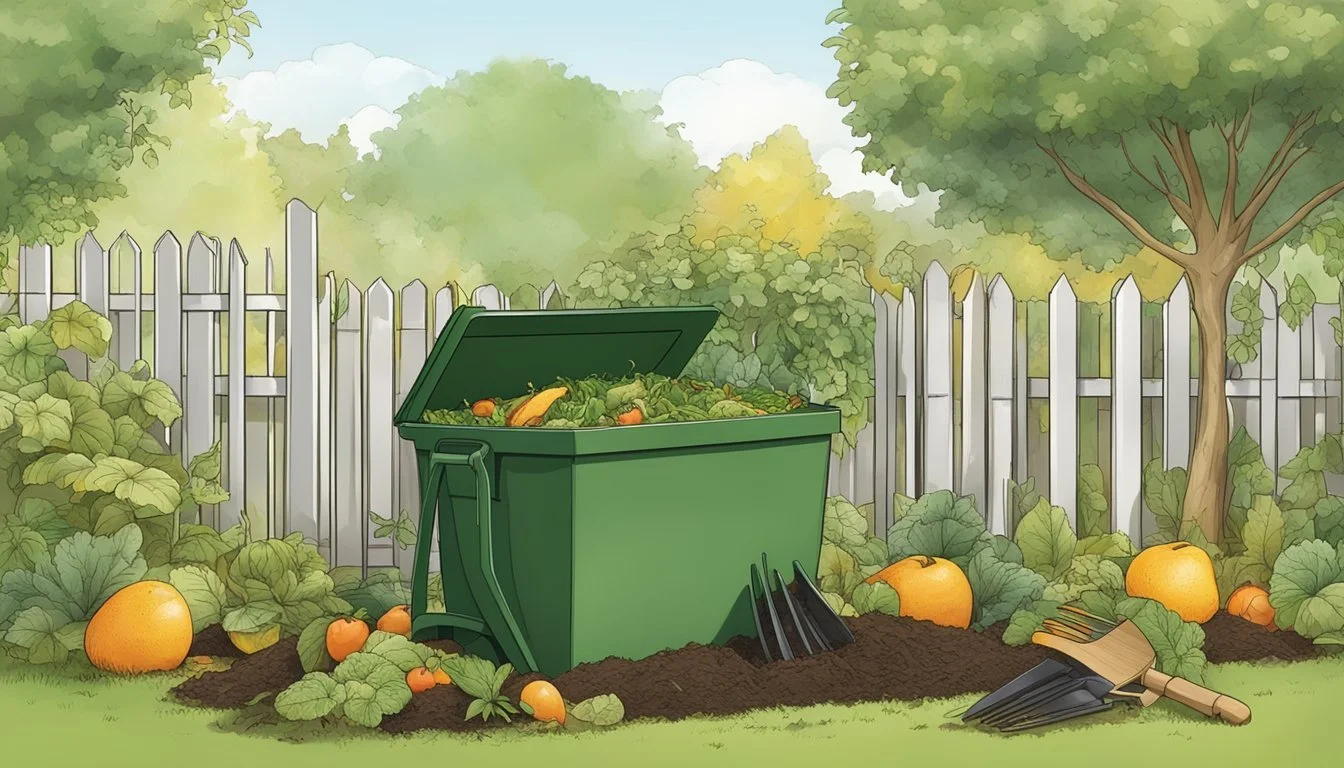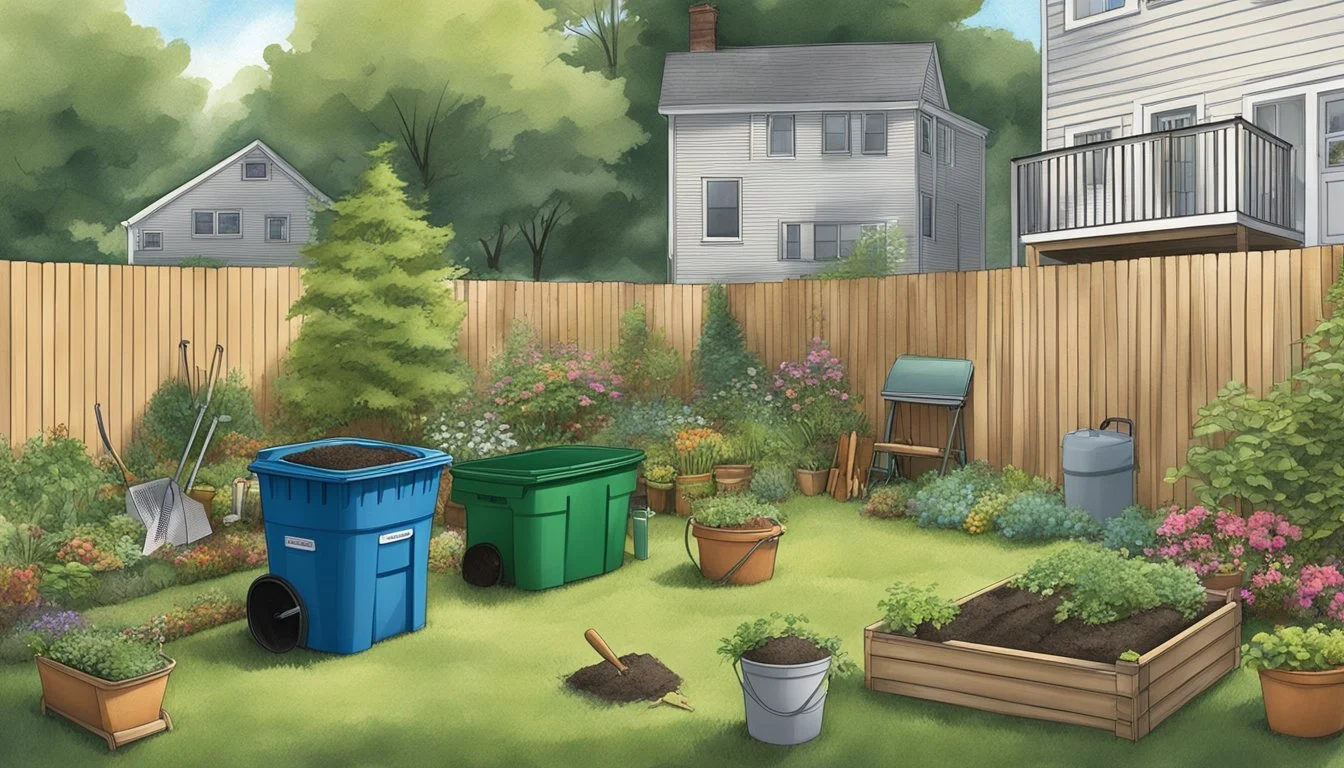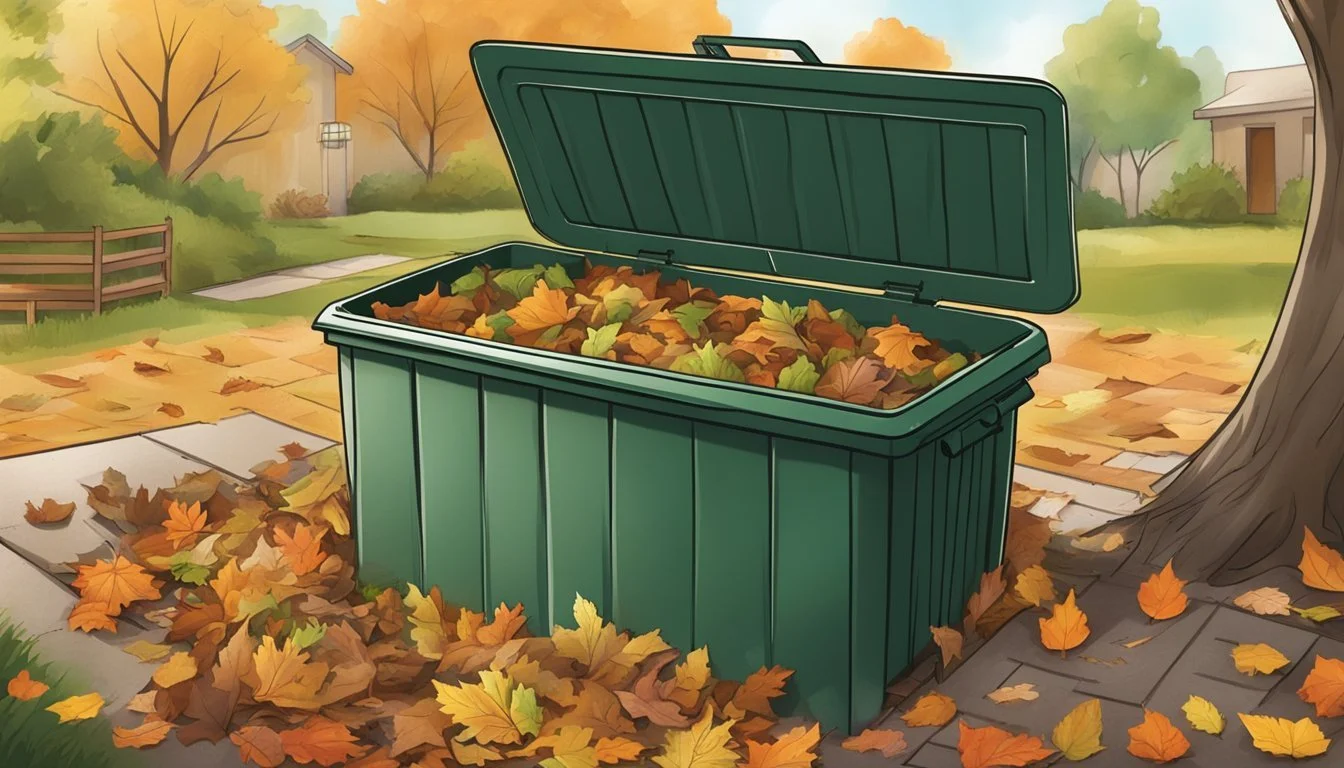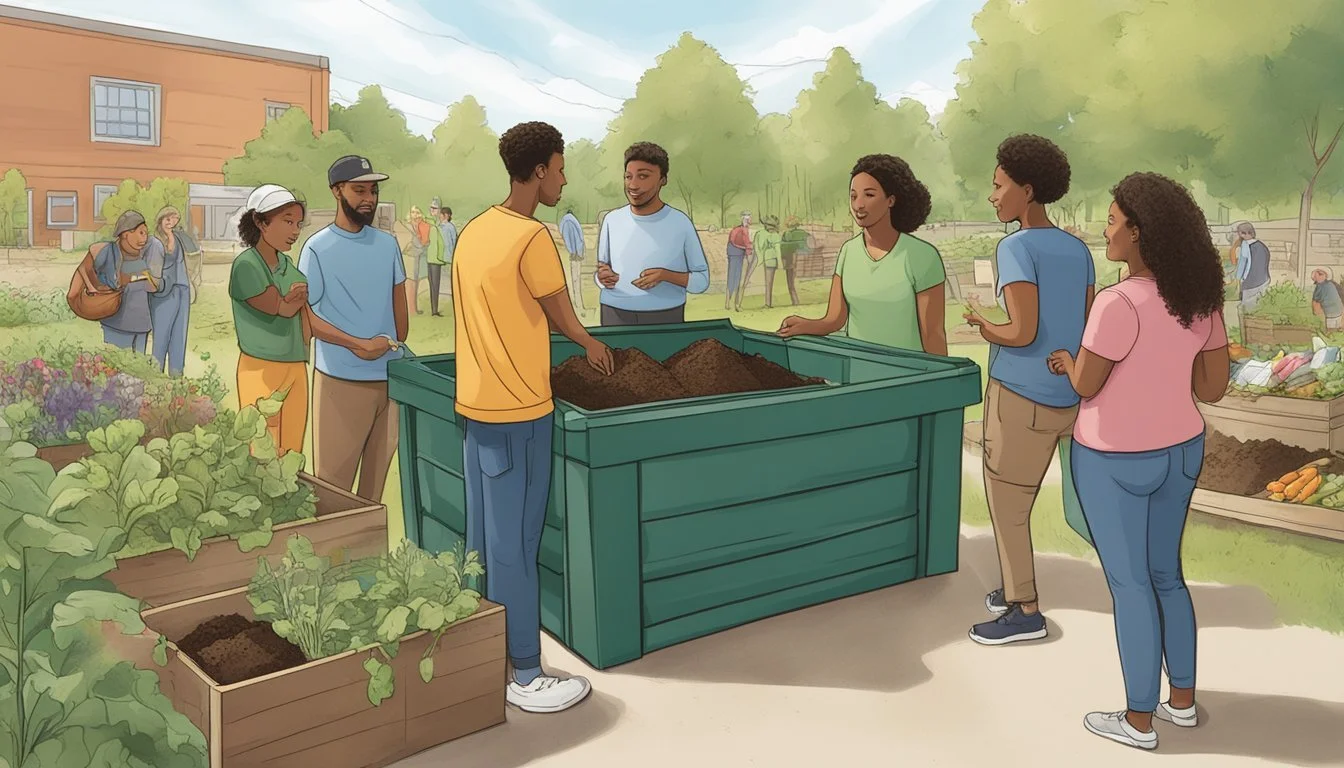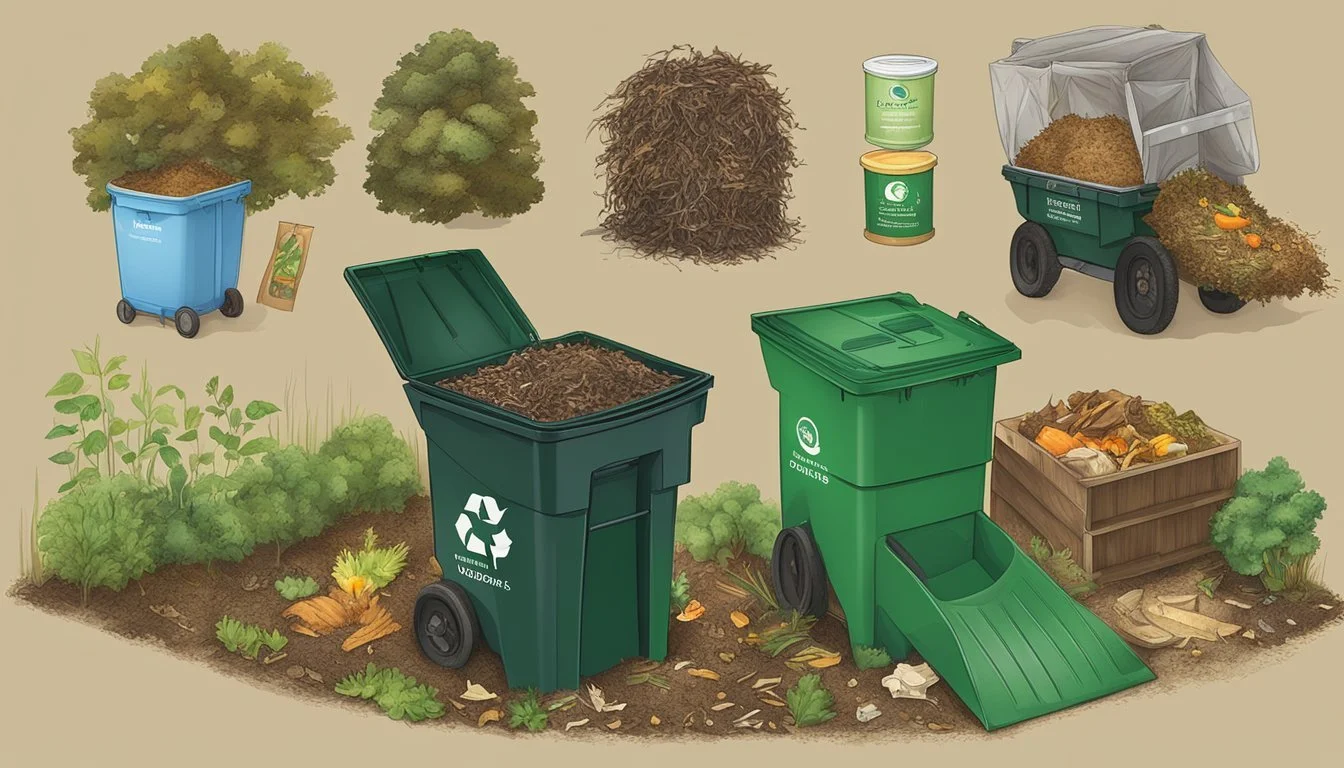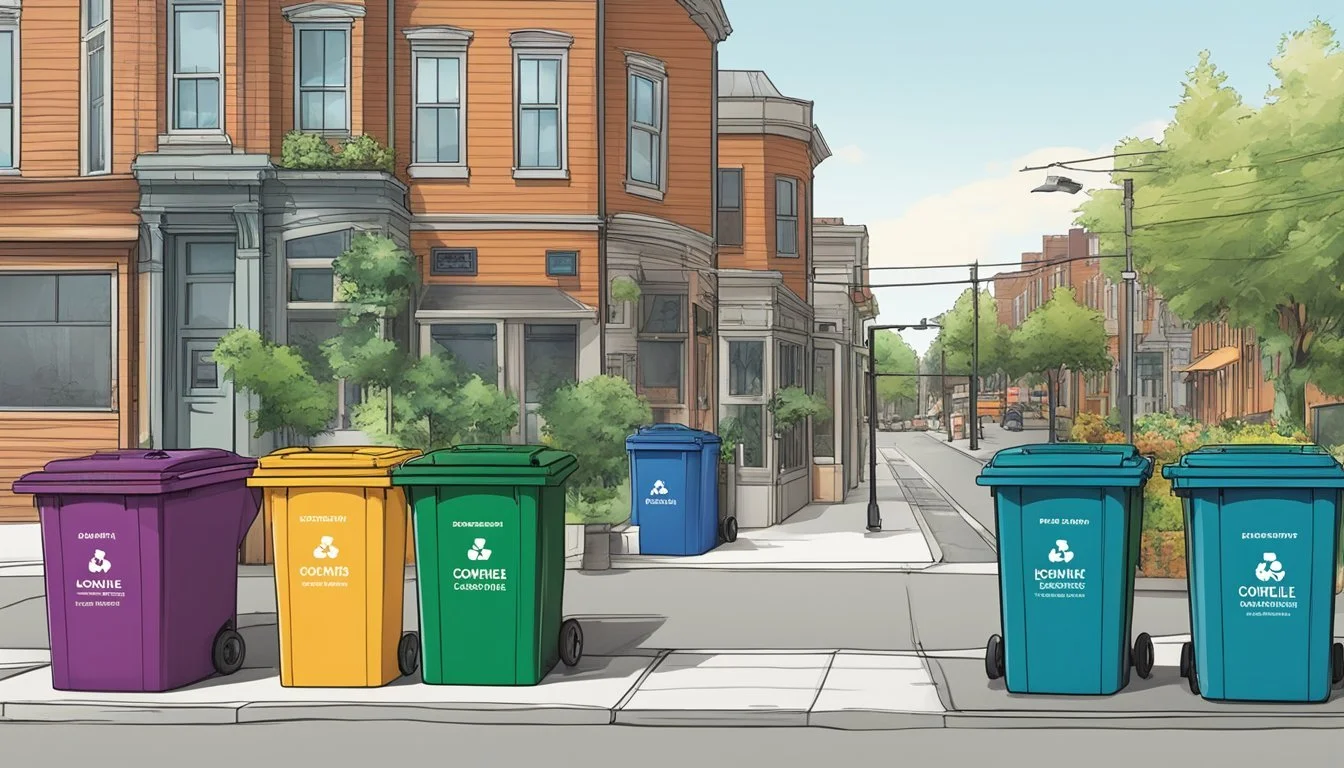Guide to Composting in Lowell, MA
Simple Steps for Sustainable Waste Management
Composting in Lowell, MA, offers residents an effective way to contribute to a more sustainable environment by turning kitchen scraps and yard waste into valuable soil amendment. This process facilitates the controlled decomposition of organic materials, which soil organisms then convert into rich, nourishing soil. By engaging in composting, individuals help to divert waste from landfills, reduce greenhouse gas emissions, and enhance the overall health of their local ecosystem.
The City of Lowell provides residents with resources and information to start their own composting practices at home. Whether citizens build or purchase their compost bins, the city supports these eco-friendly efforts by making affordable composting supplies available. Through its Solid Waste & Recycling Department, Lowell aims to increase organic material diversion from disposal to reuse, aligning with Massachusetts Department of Environmental Protection's objectives.
For newcomers to composting, the city offers guidance on creating and maintaining a successful composting system. There are also solutions for those without the space or desire to compost at home. Lowell's commitment to sustainability includes educating its residents about the benefits of composting as a crucial part of waste management, helping to foster a greener community for all.
The Basics of Composting
Understanding the fundamentals of composting is essential for successful organic waste recycling, which can enrich soil and support a sustainable ecosystem in Lowell, MA.
What is Composting?
Composting is the process of recycling organic material — such as leaves, vegetable scraps, and garden debris — to create compost, a nutrient-rich soil amendment. Through controlled decomposition, composting turns what would be waste into valuable organic matter for the soil.
Benefits of Composting
Not only does composting reduce waste sent to landfills, it also enhances soil fertility and structure. Adding compost to soil can boost its nitrogen, phosphorus, and potassium levels, while also improving moisture retention. It encourages the production of beneficial bacteria and fungi that break down organic matter to create humus, a rich nutrient-filled material.
Composting Methods
There are several methods to create compost successfully:
Aerobic Composting: Requires oxygen, achieved by regularly turning the compost pile to introduce air.
Anaerobic Composting: Happens in the absence of air, slower than aerobic and can generate odor.
Vermicomposting: Utilizes worms to break down organic material faster than typical decomposition.
Residents of Lowell can access resources and equipment for composting from the city's website, including affordable compost bins and instructions on DIY Composting. Additionally, for those looking for pre-built solutions, Lowell offers the Earth Machine compost bin, which simplifies the composting process at home.
Starting Your Compost
Starting a compost in Lowell, MA involves several key steps: finding an optimal spot, choosing the right type of bin, and maintaining a proper balance of materials. These steps ensure efficient breakdown of organic waste into nutrient-rich compost for your lawn or garden.
Choosing the Right Location
The location of a compost bin is crucial for effective decomposition. It should be placed in an area that gets some sunlight to help maintain the necessary heat for composting, but not so much that it dries out quickly. Proximity to a water source for occasional moistening is helpful, and it should be convenient to access from your kitchen to encourage regular addition of food waste.
Selecting a Compost Bin
In Lowell, residents can purchase an Earth Machine compost bin from the City of Lowell. Alternatively, one can build a bin. When selecting a compost bin, consider size based on the amount of organic waste typically generated. It should allow for oxygen flow - a key element for aerobic decomposition - and have a cover to retain heat and deter pests.
Balancing Greens and Browns
A successful compost pile requires a balance of 'greens'—nitrogen-rich materials such as vegetable scraps and grass clippings—and 'browns'—carbon-rich materials like fallen leaves and shredded paper.
Greens provide nitrogen and moisture, are often green or colorful and include materials such as:
Vegetable peelings
Fruit waste
Lawn clippings
Browns provide carbon, help add bulk and allow air to filter through the pile, and include:
Dry leaves
Branches
Cardboard
A common ratio recommended for a balanced compost is 1 part greens to 3 parts browns, by volume. This mix helps the pile to reach the high temperatures needed to break down materials quickly and kill weed seeds and pathogens. Regular turning of the pile incorporates oxygen, which microbes require to break down the waste effectively.
What to Compost
Composting is a practical way to recycle organic material. The City of Lowell, MA, promotes the transformation of various types of organic waste into enriching soil amendments, which are beneficial for garden and landscape use.
Acceptable Organic Material
Organic materials suitable for composting include:
Food scraps: Fruits, vegetables, coffee grounds, and eggshells enrich the compost with nitrogen.
Yard Waste: Grass clippings, plant trimmings, and leaves contribute to the necessary carbon balance.
Leaves: Fallen leaves provide a carbon-rich material that decomposes over time.
Manure: Herbivore manure (e.g., from horses, cows, chickens, rabbits) introduces beneficial microorganisms.
Tea: Used tea leaves and bags are excellent nitrogen sources, as long as the bags are compostable.
Offbeet Items: Items like natural corks and untreated wooden chopsticks can be accepted.
Items to Avoid in Compost
When maintaining a compost pile, avoid these items to prevent contamination and pests:
Meat and dairy products: Can attract pests and create odors.
Oils and fats: Slow down the composting process and attract unwanted pests.
Diseased plants: Might spread plant diseases within the compost pile.
Pet wastes: Can contain pathogens harmful to human health.
Plastic, glass, and metal: These materials do not break down and can contaminate the compost.
Maintaining Your Compost
Proper compost maintenance is essential for transforming organic waste into nutrient-rich soil. This section will detail the techniques to ensure that your compost pile is aerated, appropriately moist, maintained at the right temperature, and monitored for progress.
Aeration and Turning
Aeration is vital for maintaining an oxygen-rich environment, which is essential for the decomposition process. Compost should be turned regularly, ideally once a week, using a pitchfork or a compost aerator. This introduces oxygen and redistributes heat and moisture, which helps to maintain a healthy soil structure and accelerates the breakdown of organic material.
Frequency: Once a week
Tools: Pitchfork, compost aerator
Benefits: Increases oxygen, redistributes heat and moisture
Maintaining Moisture and Temperature
Compost should feel like a wrung-out sponge, moist but not waterlogged. If the compost is too dry, add water to lightly dampen it. Conversely, if it's too wet, add dry, brown materials like leaves or straw to absorb excess moisture. The ideal temperature for a compost pile is between 135-160°F. Covering the pile with a tarp can help retain heat and moisture.
Moisture: Wrung-out sponge texture
Temperature: 135-160°F
Adjustments: Add water or dry materials as needed
Monitoring Compost Progress
Regularly check the compost for signs of decomposition and soil structure development. After a few months, the compost should be dark, crumbly, and have an earthy smell. If decomposition is slow, it may require more green materials, aeration, or adjustment of moisture levels. It's important to identify and respond to the needs of the pile to ensure successful composting.
Indicators: Dark, crumbly texture; earthy smell
Troubleshooting: Adjust green materials, aeration, or moisture levels
Using Your Compost
Once your compost has transformed into a nutrient-rich amendment, it's ready to benefit your garden and plants.
When is Compost Ready?
Compost is ready when it's dark, crumbly, and has an earthy odor. It typically takes three to six months to reach this stage if turned regularly. The final product should be free from large pieces of organic matter and resemble the texture of healthy soil.
Applying Compost to Your Garden
To apply compost, mix it into the top few inches of your garden's soil. A good rule of thumb is to add a 2 to 3-inch layer of compost to garden beds. This can help improve soil structure, provide essential nutrients, and enhance moisture retention. For potted plants, sprinkle a thin layer on the surface or mix it into the potting soil.
Troubleshooting Common Issues
Effective composting in Lowell, MA requires addressing two primary concerns: Odor Management and Dealing with Pests. These issues, if left unchecked, can inhibit the decomposition process and attract unwanted attention to your compost bin.
Odor Management
Organic matter breaking down in a compost pile should not produce a foul odor. Unpleasant smells often indicate an imbalance in the carbon-to-nitrogen (C/N) ratio or insufficient air circulation. To prevent or mitigate odors, it is crucial to ensure:
Adequate Aeration: Regularly turn the compost to maintain oxygen levels, speeding up the decomposition of organic material.
Proper Balance: Aim for a C/N ratio of 25-30:1, incorporating a mix of greens for nitrogen and browns for carbon.
Dealing with Pests
Pest infestations can be a significant issue for composters. The key to keeping pests at bay lies in how the compost is maintained:
Secure the Bin: Ensure your compost bin has a tight-fitting lid and a base that can prevent animals from burrowing in.
Appropriate Materials: Avoid adding meat, dairy, or oily foods that can attract rodents and insects to the pile. Stick to plant-based scraps and yard waste.
Routine Inspection: Regular checks of the compost can catch early signs of a pest issue, allowing for timely intervention.
By addressing these elements, they can produce nutrient-rich compost while keeping common problems like odors and pests under control.
Composting at the Municipal Level
In Lowell, MA, composting is a city-managed initiative that aligns with Massachusetts state law and is regulated by the Massachusetts Department of Environmental Protection (MassDEP). These programs aim to reduce waste and promote environmental sustainability.
Lowell's Composting Programs
Lowell has established composting initiatives that offer residents opportunities to participate in waste reduction. The city encourages the conversion of organic materials into nutrient-rich soil through managed processes. Lowell provides resources for residents to engage in composting, including the sale of compost bins and compost pails. The Earth Machine, one such model of a compost bin, is available for residents at a subsidized cost, demonstrating the city's commitment to fostering sustainable waste practices.
Understanding Massachusetts Regulations
Composting operations in Lowell must comply with MassDEP regulations. The department has issued guidance documents to assist municipalities in establishing and operating leaf and yard waste composting programs. These guidelines provide a framework for implementing low-technology, municipal-scale composting facilities. Additionally, MassDEP's goal is to increase the diversion of organic materials, like yard waste and food scraps, from disposal to composting, thereby adhering to and reinforcing state environmental laws and policies.
Community and Educational Resources
In Lowell, MA, residents and educators have access to robust resources that foster an understanding of composting practices and promote community participation. These offerings enhance awareness and encourage sustainable living throughout the Merrimack Valley region.
Workshops and Training in Merrimack Valley
Various workshops and training sessions are available for those interested in learning about composting. The City of Lowell provides residents with educational resources like the Do it Yourself (DIY) Composting guide, which includes detailed instructions on how to start and maintain a compost system. These educational materials also extend to local schools through programs like Recycling & Composting for Kids, Teachers & Schools, facilitated by the Massachusetts Department of Environmental Protection. These initiatives aim to incorporate composting into school curriculums, reinforcing the importance of responsible waste management.
Available Resources:
Workshops on building compost bins
Guides on how to compost effectively
Educational programs for schools
Educators in the Merrimack Valley can integrate these resources into their teaching to provide practical sustainability education.
Volunteering and Community Engagement
Engagement in composting extends beyond personal and educational settings and into the broader community. Volunteering opportunities, such as those offered by the City of Lowell's Solid Waste and Recycling Department, allow individuals to actively participate in local environmental initiatives. Community engagement through feedback channels enables residents to contribute to the development and improvement of composting programs. This cooperative effort not only bolsters community ties but also directly impacts the effectiveness of the region's waste management strategies.
Opportunities for Engagement:
Volunteer roles in waste management projects
Community meetings to discuss composting initiatives
Feedback platforms for program refinement
By providing these resources and opportunities, Lowell, MA demonstrates a commitment to sustainable practices and community involvement in the Merrimack Valley.
Beyond Traditional Composting
Exploring innovative composting methods such as vermicomposting and sustainable practices like grasscycling is crucial to furthering Lowell's green initiatives. These methods offer environmentally friendly options for managing organic waste and supporting a zero waste goal.
Vermicomposting and its Advantages
Vermicomposting leverages the natural process of decomposition by worms to turn organic waste into nutrient-rich compost. In this method, red wigglers—an efficient species of composting worms—are commonly used. They thrive on organic waste, such as fruit and vegetable scraps, paper, and yard trimmings.
Advantages of Vermicomposting:
Soil Enrichment: Worm castings enhance soil structure and provide essential nutrients.
Waste Reduction: Diverts food scraps from landfills, lowering methane emissions.
Usability: Can be easily done indoors, making it accessible for urban residents of Lowell.
Grasscycling and Other Sustainable Practices
Grasscycling involves leaving grass clippings on the lawn after mowing, allowing them to decompose and return nutrients to the soil. This practice not only eliminates the need to bag clippings but also feeds the lawn, promoting a sustainable lawn care approach.
Sustainable Garden Practices:
Using mulch to retain soil moisture and reduce weed growth.
Selecting drought-resistant plants to minimize water usage.
Implementing rain barrels to utilize natural rainwater for gardening.
In Lowell, the community is encouraged to adopt these sustainable practices to maintain gardens and contribute to a healthier ecosystem. Practices such as grasscycling and the use of compost produced through vermicomposting enrich the garden while reducing waste.
Special Considerations in Composting
Effective composting in Lowell, MA, requires careful consideration of space limitations and seasonal temperature changes. These constraints can influence the methods and tools one uses to compost successfully.
Composting in Small Spaces
Residents looking to compost within confined areas may benefit from compact solutions such as indoor bins or worm composting systems. Lowell offers compost bins for purchase, designed to fit conveniently into limited spaces. These bins can be placed on a balcony, porch, or in a small yard to allow for efficient composting without requiring significant space.
Winter Composting
Composting during cold months presents unique challenges. The microbial activity that breaks down organic matter slows down in cold temperatures. However, by maintaining a balance of greens and browns and ensuring proper insulation, composting can continue throughout winter. In Lowell, curbside collection of compostable materials may be affected by winter weather, so it's crucial to manage composting activities accordingly, possibly storing compostable materials when collection is interrupted.
Local Initiatives & Advocacy
Lowell, Massachusetts, is actively engaging in environmental sustainability through local composting initiatives and coalitions. These programs aim to reduce landfill waste and promote sustainable practices within the Merrimack Valley region.
Merrimack Valley Compost Coalition
The Merrimack Valley Compost Coalition represents an amalgamation of local organizations dedicated to advocating and implementing composting practices in the area. They provide resources and support for community composting activities, often collaborating with municipal efforts to enhance environmental education and reduce organic waste.
Lowell's Sustainability Goals
In support of its sustainability goals, the City of Lowell offers composting bins for residents to encourage the diversion of kitchen and garden waste away from the traditional waste stream. Not only does this align with Lowell’s commitment to sustainable practices, but it also fosters a community-wide understanding of the environmental benefits of composting. Through workshops, compost bin sales, and online guides, Lowell equips its residents with the tools needed to transform organic waste into a valuable resource for the city’s gardens and landscapes.
Recycling and Composting Policy Updates
The landscape of waste management in Lowell, MA, has seen notable updates, particularly in composting regulations and state-wide recycling initiatives, which affect both residents and businesses.
Recent Changes in Composting Regulations
In Lowell, Massachusetts, recent adjustments to composting regulations have streamlined processes for organic waste recycling. The city emphasizes the importance of diverting food scraps and yard waste from landfills. Residents are encouraged to participate in Do it Yourself (DIY) Composting, leveraging methods such as earthworm farms, especially when yard space is limited. These changes are part of a broader effort to reduce methane emissions from organic waste, thus contributing to the city's sustainability goals.
Recycling and Composting at the State Level
Massachusetts has taken an active role in promoting organic recycling through its Composting & Organics initiative. MassDEP (Massachusetts Department of Environmental Protection) works diligently to prevent yard waste, food scraps, and other compostables from entering the waste stream. A clear state law mandates the diversion of these materials from disposal to recycling and composting channels, reinforcing Massachusetts' commitment to environmental responsibility. The Home Composting & Green Landscaping guidelines highlight ways in which citizens can contribute to this green effort, guiding on best practices for maintaining eco-friendly gardens.
Advanced Topics in Composting
Before diving into advanced composting topics, it's important to understand that composting is more than just piling up organic material. Progressing beyond the basics requires an appreciation of the underlying science and an awareness of evolving technologies that enhance efficiency and environmental benefit.
Science of Decomposition
Understanding the Science of Decomposition is crucial for advanced composting practices. It involves a complex interplay of organic materials and microorganisms. Aerobic bacteria, fungi, and other soil organisms play a pivotal role in breaking down organic matter. These organisms require a balance of nitrogen, carbon, oxygen, and moisture to efficiently convert yard waste and food scraps into nutrient-rich compost. This process not only recycles essential nutrients but also helps divert organic waste from landfills, thereby reducing methane emissions—a potent greenhouse gas.
Innovative Composting Technologies
Innovative technologies are shaping the future of composting in Lowell. These advancements aim to optimize the process, making it more beneficial and sustainable. For instance, in-vessel composters can process large volumes of organic waste with minimal odor and land use. Moreover, anaerobic digestion technologies are significant as they capture the gases produced during decomposition, which can be used for energy generation. These technologies illustrate a leap towards reducing waste while creating value-added products from organic matter otherwise destined for a landfill. Lowell's engagement in anaerobic digestion of back-of-house waste exemplifies a commitment to sustainable waste management and energy production.
Supplemental Information
This section provides practical guidance on handling non-compostable materials and emphasizes the importance of responsible consumption to reduce wastage in Lowell, MA.
Disposal of Non-Compostable Waste
In Lowell, certain waste items cannot go into compost bins. These include recyclables such as cans and textiles, which should be directed towards appropriate recycling programs. For instance, mattresses are notoriously difficult to dispose of due to their size and composition, but Lowell has specific guidelines for mattress disposal.
Cans: Should be cleaned and placed in recycling bins.
Mattresses: Check with city regulations for disposal days or dedicated facilities.
Textiles: Donate usable textiles or find local recycling options if they are worn out.
Responsible Consumption and Waste Reduction
They encourage residents to adopt practices that limit waste production. This includes purchasing items with less packaging, reusing materials when possible, and recycling effectively. For example, a better understanding of what materials are recyclable in Lowell can prevent recyclable items like cans from ending up in landfills.
Recycle Right: Familiarize oneself with local recycling guidelines to ensure proper separation and disposal.
Buy Smart: Opt for products with minimal packaging to reduce waste.
Upcycle Textiles: Repurpose old clothing instead of discarding them.
By attending to non-compostable waste responsibly and fostering waste reduction habits, individuals can make a substantial impact on the environment.


